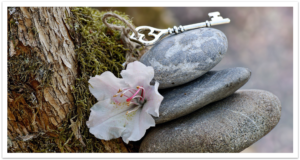Do you trust your intuition?

“Insight is not a lightbulb that goes off inside our heads. It is a flickering candle that can easily be snuffed out.”
~Malcolm Gladwell, Blink: The Power of Thinking Without Thinking
Do you trust your intuition? As promised last month, this post is about Trusting yourself and using your intuition and body knowledge. When I moved back to Charleston, SC, after living in Austin, TX, for 10+ years, the general reaction around me was, “What?” followed by “Why?!” The answer to the second question was a lot easier than the first one: because my heart and gut were telling me to go. The first question turned out to be a lot more about “What will you do there?” In other words, the question was about how I would handle the strategic planning and logistics of this major life change. My body told me in no uncertain terms that I was ready for something new: my feet bounced in my shoes, and my heartfelt light and expansive when I envisioned the South Carolina marshes and coastal waters.
Malcolm Gladwell, in his popular book Blink: How we think without thinking, talks about choices that seem to happen in an instant—in the blink of an eye—that aren’t as simple as they seem. The art of ‘thin-slicing’ is Gladwell’s term for the ability to filter the few factors that matter from an overwhelming number of variables. To me, this is just another way of saying, “use your intuition to make decisions.” Intuition is a tool any human can use.
Considerations when using intuition
- If you are considering a major change, it’s OK to think about the consequences logically. Ask yourself, “What am I hoping to get out of this major change?” Then, make sure your gut is telling you to run toward something and not away from something.
- At some point, you will have to stop thinking and start acting. It’s easy to get caught up in trying to change a relationship, whether with a person or a job, and talk and talk and talk about what’s right, what’s wrong, and where to go from here, without ever taking action.
- In the end, you will most likely have an internal “knowing” of what is right, and then the trick is following through with the appropriate action steps without getting stuck in fear of change. Don’t let your pre-frontal cortex get in the way of your heart and gut and start second-guessing yourself. Remember how good you felt in the space of “knowing.”
- Yes, you will probably lose something as a result of the change. It might be friends or colleagues or a place you particularly loved. Be OK with that. It sometimes helps to notice that friends and colleagues may shift over time simply as a result of changing life stages. Focus on where you are going, and the joy you are finding in a new direction. New friends and support structures will emerge.
- Some things may go wrong or not at all, according to your plan or vision. Remind yourself that we all encounter boulders on the path, but we can learn to walk around or over them and keep moving on. Keep doubt at bay by maintaining your optimism even in the face of setbacks.
Using intuition with a good outcome
I’ve made decisions by trusting my intuition, and I’ve made decisions by carefully plotting out the pros and cons. The ones based on intuition have often been right, while the carefully crafted decision has sometimes been tossed at a later date. For instance, when I was in my early twenties, I broke off an engagement after dreaming I was careening down the aisles of a speeding locomotive carrying a precariously balanced tiered wedding cake, with no way to get off. I woke up knowing exactly what I needed to do. It was hard, but breaking off that engagement was the right thing for me.
Ignoring intuition for a bad outcome
When my first husband died, I knew immediately I would move my young children from Charleston back to Austin, where I had a network of people in place. In planning for this move, I contacted the company where I had worked before the move to the East Coast. I had all kinds of logical reasons for returning to my old position, such as “I know the people, I have the skills, I know the kind of work, and I am good at it.” Happily, the company was willing to re-employ me. Yet even as I was saying “yes” on the phone, I felt my stomach drop like a stone. I only lasted a few weeks before I had to leave because I was so unhappy there. You really cannot go backward in time. If I’d listened to my intuition, I would not have had to go through the agony of returning and then leaving again so quickly.
Trusting yourself using body knowledge
Robert Resnick, a clinical psychologist who has done a lot of work in this area, says you should trust your own intuition. Use your body as a guidance system. If an action or person feels good to you inside your body, then you are good to go, and if it feels bad inside, then you know something is off, and you may want to rethink whatever you are planning to do.
It’s worth trusting your body to tell you if you’re off course or on course. According to Ann Betz, who has studied and written a lot about neuroscience and coaching, nine times more information flows from your body to your brain than from your pre-frontal cerebral cortex to your body. Intuition is not woo-woo. There is a neurological and physiological basis for these feelings.
Stephen Porges has written a lot about the physical basis for this statement in terms of research around the vagus nerve and human response to whether we feel safe or in danger. The vagus (sometimes called the pneumogastric nerve) is the tenth and longest cranial nerve. It runs from the brain to the lower abdomen and interfaces with the heart, lungs, and digestive tract. Basically, it serves to connect the brain to the body and can send “action alerts” via electrical impulses. Doing a “gut check” before you decide to do something can save you a lot of painful hindsight.
In summary, intuition is an essential tool for decisions about what to change and how. Use it wisely.
Tags: intuition, self-trust






